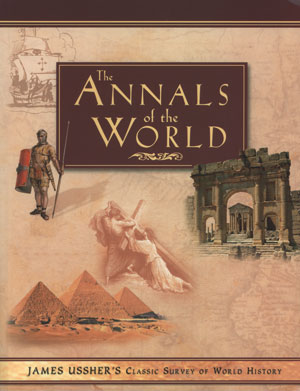 I have a habit of chosing the largest, weightiest books I can find. Although I have never read Tolstoy’s War and Peace, several years ago I slogged through Ayn Rand’s Atlas Shrugged, and my favorite fiction work is Alexandre Dumas’s The Count of Monte Cristo – all 1,400 pages of it.
I have a habit of chosing the largest, weightiest books I can find. Although I have never read Tolstoy’s War and Peace, several years ago I slogged through Ayn Rand’s Atlas Shrugged, and my favorite fiction work is Alexandre Dumas’s The Count of Monte Cristo – all 1,400 pages of it.
However, my latest literary adventure, The Annals of the World, dwarfs all of these. James Ussher (1581-1656) was an Irish archbishop who studied the Bible, did a lot of math, and came to the conclusion that God created the world on October 23, 4004 B.C. After years of research he wrote this book, which covers the history of the entire Middle East and Roman Empire up to the year 73 A.D. The book takes the Bible and various secular historians as its sources.
The difficulty for me is not the subject matter, which is a bit dry at times, but rather the endless stream of names. I am familiar with Nebuchadnezzar, but it gets confusing to also read about Nebucadnetzar, Nabopolassar, and Nabuchodonosor. I think the latter two might be the same person. It’s difficult to tell.
This book reminds me of the numerous musical terms I had to learn for my sophomore proficiency exam in college. Many terms I had never seen before, and that they were all in French, German, and Italian was unhelpful. I do not have a gift for learning new languages. I made a large stack of notecards with all the terms on them, but now I can only remember zurückhaltened. It sticks out because I learned ahead of time that it was the horn professor’s tradition to ask every brass major what the word meant. I had to look online to rediscover that it means “somewhat held back.” My guess after 15 years was that it had something to do with mutes.
I also remember dolce, which means “sweetly,” but that term sticks out only because I was a tuba player. I never understood how tuba and dolce went together and to this day refer to it as my least favorite musical term.
When chatting with Jason Garcia about the article on page 14, I was intrigued that he referred to musical terms as instructions to music. I once heard a conductor say that any musical term I didn’t know the meaning of was a message to watch the director, but that was as close as I’d ever come to thinking of the vocabulary of music as instructions. It makes me wish I had put more effort into learning these terms.
It has been said that life doesn’t come with instructions, but almost everything else does, and it seems that reading them often pays off. As I go through my daily Mensa calendar I find that the puzzles I give up on are frequently the ones for which I might have gotten the answer if I had read the instructions more carefully. Maybe reading some instructions on how to remember names would help me get through The Annals of History more easily. I still have 790 pages to go.




